foundational documents
1/48
Earn XP
Description and Tags
Name | Mastery | Learn | Test | Matching | Spaced |
|---|
No study sessions yet.
49 Terms
1st amendment
freedom of religion (free exercise & establishment clause), freedom of speech, freedom press, peaceful assembly, freedom to petition the govt.
2nd amendment
right to bear arms
3rd amendment
no quartering of soldiers
4th amendment
no unreasonable searches or seizures, exclusionary rule
5th amendment
right to grand jury, no double jeopardy, justly compensate, no self incrimination
6th amendment
right to speedy trial, writ of habeas corpus, right to face witness
7th amendment
US common law, statutory law, appeal on facts and facts alone
8th amendment
no excessive bail
9th amendment
reserved powers, people limit the government
10th amendment
reserved powers, states limit the federal government
11th amendment
federal courts hold the power in cases where someone sues someone from a different state
12th amendment
allows president to run w/ chosen VP
13th amendment
abolishes slavery except punishment in prison
14th amendment
federal laws passed require states to follow that law
15th amendment
citizens cannot be denied the right to vote because of race
16th amendment
progressive income tax
17th amendment
direct election of senators
18th amendment
prohibition
19th amendment
women's suffrage
20th amendment
lame duck
21st amendment
abolishes prohibition
22nd amendment
2 terms for president
23rd amendment
gave D.C. 3 electoral votes
24th amendment
eliminates poll tax & literacy test
25th amendment
Presidential Succession
26th amendment
18 to vote
27th amendment
congress cannot vote itself pay raises
McCulloch v. Marlyand (1819)
-federalism
-Necessary and Proper Clause decided that the Second Bank of the United States could not be taxed by the state of Maryland because Maryland could not tax instruments of the national government employed in the execution of constitutional powers
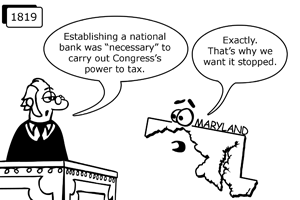
US v. Lopez (1995)
-federalism
-A case in which the Court found the 1990 Gun-Free School Zones Act unconstitutional for overstepping the congressional boundaries of the Commerce Clause and is not an economic activity
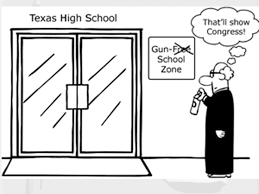
Engel v. Vitale (1962)
-freedom of religion
-School sponsored prayers in public schools violated the first amendment rig

Wisconsin v. Yoder (1972)
-freedom of religion
-The Court held that individual's interests in the free exercise of religion under the First Amendment outweighed the State's interests in compelling school attendance beyond the eighth grad
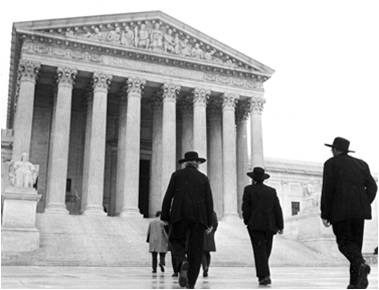
Tinker v. Des Moines (1969)
-Freedom of speech
-First Amendment right includes that school-wide discipline can not go against freedom of speech through prote

Schenck v. US (1919)
-freedom of speech
-Schenck was charged with conspiracy to violate the Espionage Act of 1917 by attempting to cause insubordination in the military and to obstruct recruitme
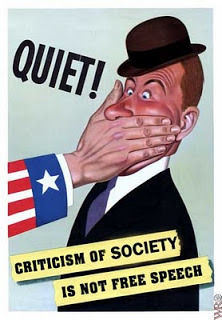
NY Times v. US (1971)
-freedom of the press
-The First Amendment overrides the federal government’s interest in keeping certain documents, such as the Pentagon Papers, classified
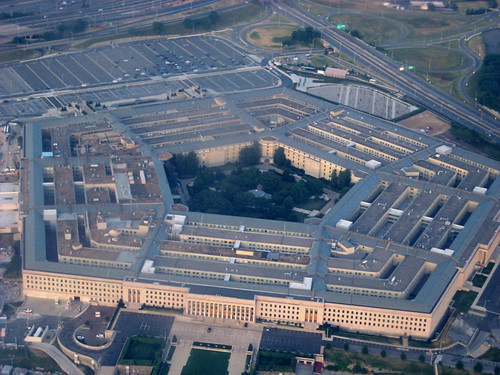
Gideon v. Wainwright (1963)
-Rights of the accused
-the Sixth Amendment of the U.S. Constitution requires U.S. states to provide attorneys to criminal defendants who are unable to afford their own

Roe v. Wade (1973)
-
-The Due Process Clause of the Fourteenth Amendment dictates the fundamental “right to privacy” that protects a pregnant woman’s choice of whether to have an abortion
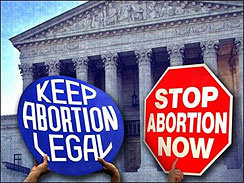
Morse v. Frederick (2007)
-freedom of speech
-Schools can censor students free speech if it promotes drug us
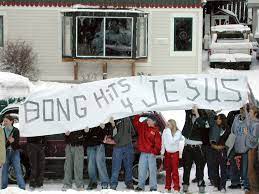
DC. v. Heller (2008)
-right to bear arms
-Second amendment found a District of Columbia law strictly regulating gun ownership to be unconstitutional.

McDonald v. Chicago (2010)
-right to bear arms
-A case in which the Court held that the Fourteenth Amendment makes the Second Amendment's right to bear arms for the purpose of self-defense applicable to the states
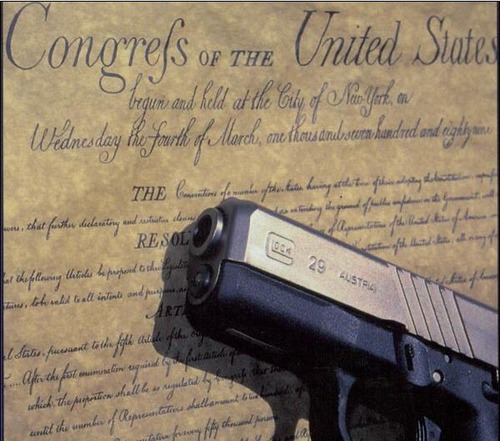
Brown v. Board of Ed. (1954)
-equal protection
-Lower courts deemed that blacks and whites could be separated as long as their own facilities were equal, but the Supreme Court overruled, stating that it was unequal to separate them under the 14th Amendment. Thus, leading to the banning of segregated schools as the education of African American children suffered
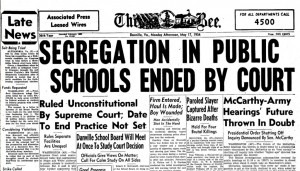
Citizens United v. FEC (2010)
-campaign contributions
-Companies are recognized as people and can use money as free speech
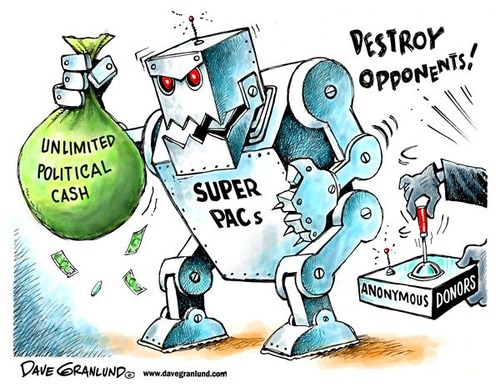
Baker v. Carr (1962)
-voting rights
-The 14th amendment protects if a district wants to challenge electoral boundaries redistricting may happen
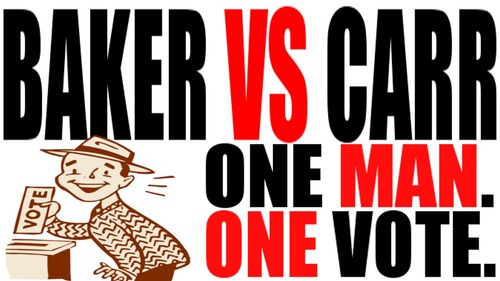
Shaw v. Reno (1993)
-voting rights
-The 14th amendment right made gerrymandering, bizarrely shaped districting, unlawful on the basis of race
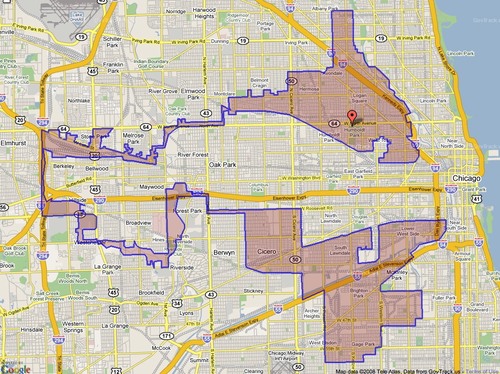
Marbury v. Madison (1803)
-Judicial review
-The Court ruled that the relevant provision within the Judiciary Act of 1789 was unconstitutional, noting that issuing writs of the mandate was outside of the “original jurisdiction” of the Supreme Court as established in Article III of the constitution.
(simple - Supreme Court case that established the principle of judicial review in the United States, meaning that American courts have the power to strike down laws and statutes that they find to violate the Constitution of the United States.)
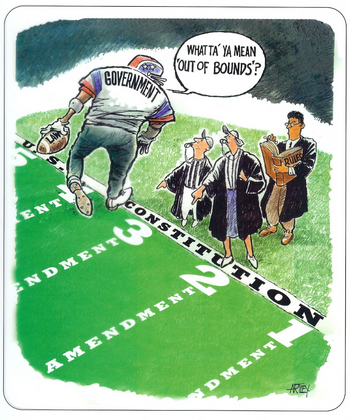
federalist 10
the great number of factions and diversity that would avoid tyranny. Groups would be forced to negotiate and compromise among themselves, arriving at solutions that would respect the rights of minorities. Further, he argued that the large size of the country would actually make it more difficult for factions to gain control over others.
Brutus 1
1. Brutus believes that Congress will get to make any laws that they want and that the laws will be to benefit the leaders
2. The states will no longer be a confederation but a republic with rules/ laws that everyone must follow
3. The Supremacy Clause states that the federal laws have power over the state laws, so the state government could be disregarded by the federal government
federalist 51
give each department a will of its own.
the members of each should have as little agency as possible in the appointment of the members of the others.
each department should be as little dependent on the other as possible.
each department should be able to resist the encroachments of the others.
checks and balences
federalist 70
executive department
federalist 78
proposed structure of federal courts, their powers and jurisdiction, the method of appointing judges, and related matters.
emphasized the importance of an independent judiciary and the power of judicial review.